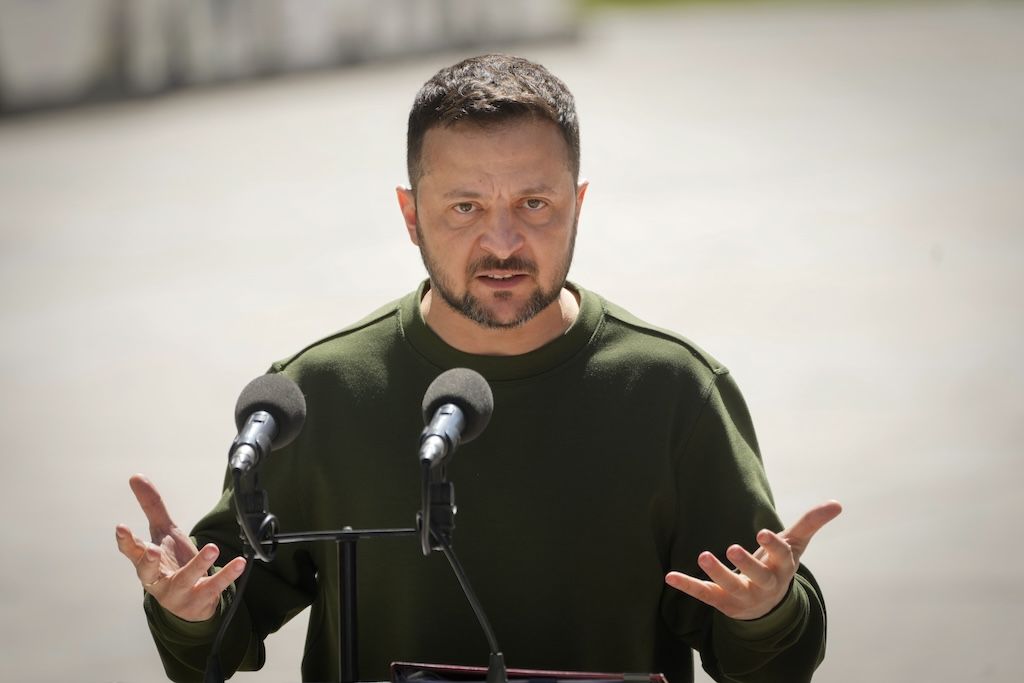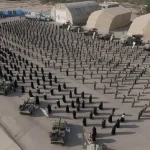

NATO’s most senior military officer believes the alliance has to continue arming Ukraine and stop allowing Russian President Vladimir Putin to deter it from aiding Kyiv to the best of its abilities.
Adm. Rob Bauer, the chairman of the Military Committee of NATO and the military adviser to the secretary-general and the North Atlantic Council, acknowledged on Friday that the alliance has allowed Putin to “self-deter” the United States and the alliance from acting in Ukraine’s best interests “many, many times.”
“We’ve heard many times that Putin or other officials used the word ‘red lines’ when it came to the tanks, when it came to the HIMARS, when it came to the ATACMS,” he said during a Washington Post Live event. “And every time, we sort of waited a little bit longer to think about it, and then we gave it, and the result was actually that it wasn’t a red line, but the actual result was that the Russians were able to strengthen their defensive works in Ukraine.”
“I think the time is over that we should allow Putin to self-deter us because that’s basically what has happened many, many times,” Bauer explained.
His comments came as world leaders, including Ukrainian President Volodymyr Zelensky, traveled to France to commemorate the 80th anniversary of the Allied forces’ D-Day invasion on June 6, 1944. President Joe Biden also recently announced a new policy reversal that allows Ukraine to use U.S. weapons to hit targets in Russia, though several restrictions still apply.
Russian forces massed along the border near the Ukrainian city of Kharkiv and were able to attack the city aerially while remaining in a sanctuary of sorts because Ukraine did not have U.S. approval, before recently, to use U.S. weapons to hit those targets on the other side of the border.
Ukraine is still barred from hitting targets further inside Russia, though U.S. officials have indicated those restrictions could also be lifted, but that has yet to happen.
“It is the best thing to do. If you are attacked from a nation that is illegally attacking you, and they start a war, and you are defending yourself, you can do two things: You can wait until the missiles reach you and then try to kill the arrows, or you kill the archer, and the archer is, in many ways, in Russia,” Bauer said when asked about the risks of allowing the Ukrainians to hit targets in Russian territory.
From a tactical standpoint, Bauer argued it is beneficial for a defending military to strike in the aggressor’s territory to push it back and force it to operate from further away. That also requires longer-range weapons, which Biden has decided to provide to Ukraine after initially balking at the idea.
“Again, in the law on armed conflicts, there’s no limits in terms of the range. So, militarily, again, if the target is deeper into Russia, then militarily, you want to strike that target. If, for example, the aircraft that take off from an airfield deeper into Russia, what we’ve seen with the increasing range that the Ukrainians have been given to strike was that the Russians had to push back to bring back their logistic nodes, and that, of course, makes it more difficult for the Russians to be successful in the fight. If you have to bring back your logistics from, let’s say, 10, 15, 20 kilometers to 50, 100 kilometers, that will make it more cumbersome for the Russians to bring in the logistics, and that helps in the fight,” he added.
Putin, who has frequently spoken about Russian escalation and the country’s nuclear arsenal, did so again this week.
“Ultimately, if we see that these countries are being drawn into a war against us, and this is their direct participation in the war against the Russian Federation, then we reserve the right to act in a similar way,” he said, according to NBC News. “But, in general, this is the path to very serious problems.”
Ukraine has received a boost of U.S. support in recent weeks after several months of congressional inaction prevented the administration from providing additional military aid to Ukraine.
CLICK HERE TO READ MORE FROM THE WASHINGTON EXAMINER
“It’s safe to say that while they are still under pressure from the Russians, particularly in the East, that because they have now been able to receive the benefits of five security packages and now six coming as the president announced today, that they have been able to thwart Russian advances, particularly around Kharkiv,” National Security Council coordinator John Kirby said on Friday. “The Russians really have kind of stalled out up there.”
“Their advance on Kharkiv is all but over,” he added.






